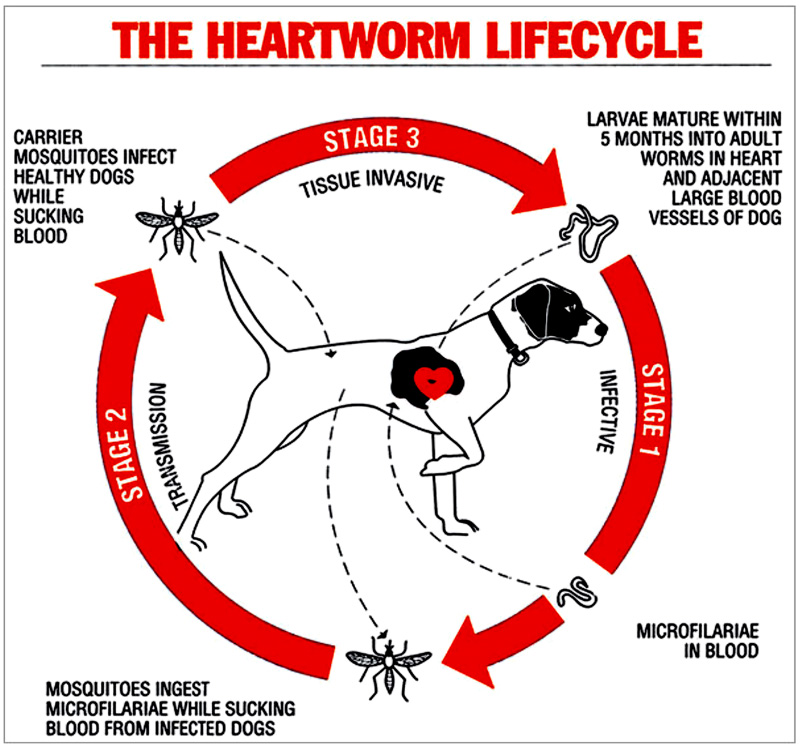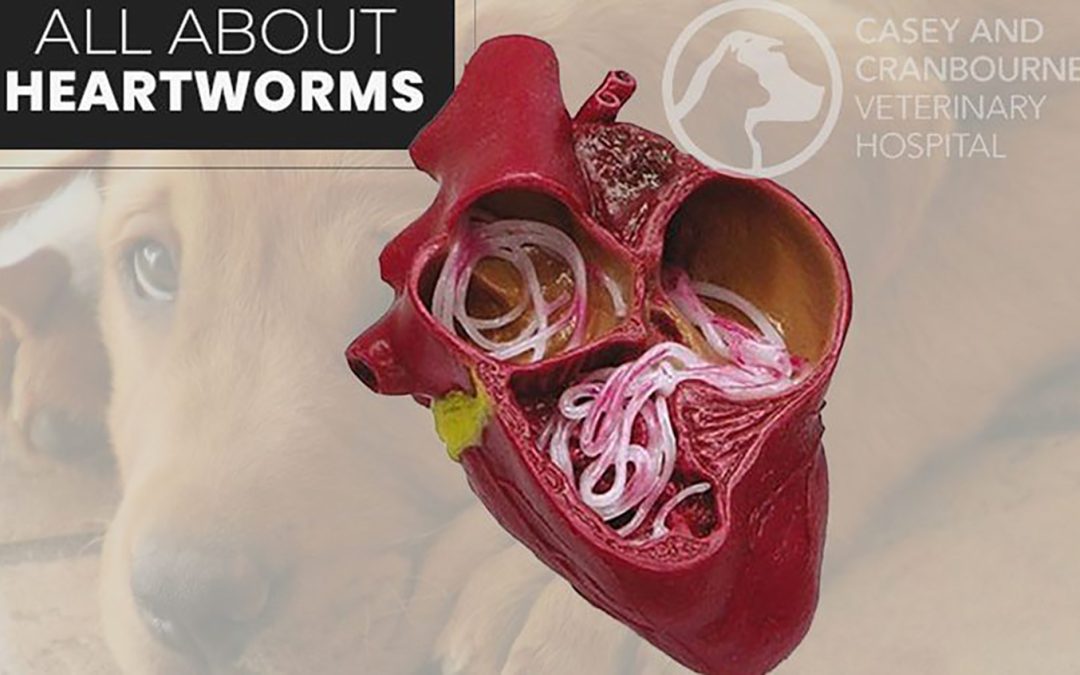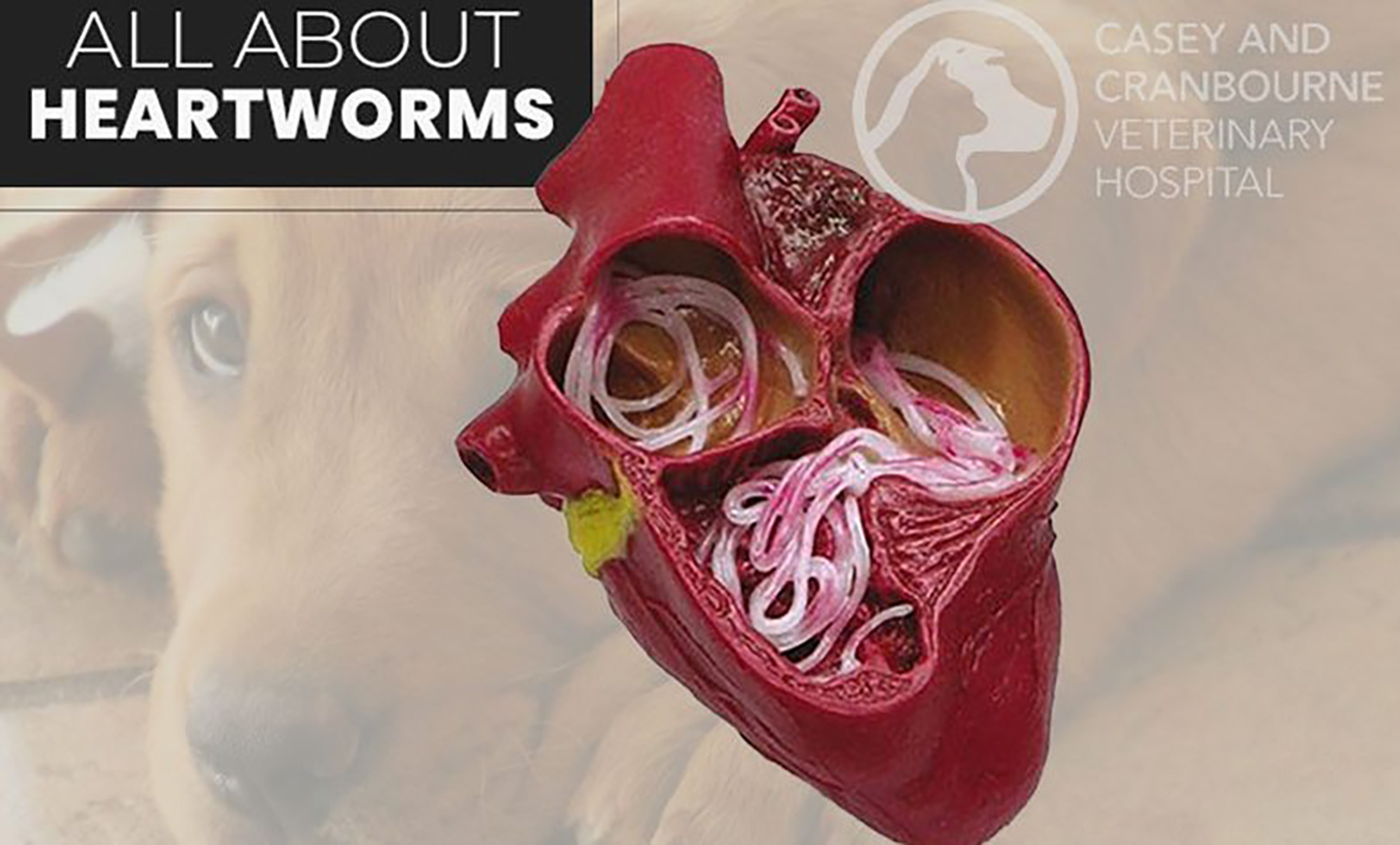ANIMAL OWNERS BE ALERT:
WHAT YOU SHOULD KNOW ABOUT HEARTWORM (DIROFILARIA IMMITIS) IN CATS AND DOGS
THE FACTS:
THERE HAVE NOW BEEN 3 CONFIRMED CASES OF HEARTWORM IN DOGS IN THE LOCAL AREA, INCLUDING ONE CASE THAT WE ARE TREATING AT CASEY AND CRANBOURNE VETERINARY HOSPITAL.
THE OFFER:
FREE HEARTWORM TEST, FREE SINGLE FLEA AND TICK TREATMENT AND A FREE INTESTINAL WORMING TREATMENT FOR PATIENTS STARTING OR RECOMMENCING AN ANNUAL PROHEART SR12 HEARTWORM PREVENTION COURSE
WHAT IS HEARTWORM DISEASE?
With the current climate of significant rainfall and warmer weather affecting the east coast of Australia, there are concerns for larger numbers of mosquitos spreading mosquito borne diseases for both animals and humans alike.
The most common mosquito borne disease that we encounter in dogs is Heartworm (Dirofilaria Immitis) and it is becoming an increasingly significant health problem. Heartworm in Australia has long been considered only a problem in tropical and subtropical coastal regions. However, in recent decades, it has become increasingly prevalent in more southern areas. Over 30 species of animals can be infected with the disease, predominately dogs but also cats, foxes, ferrets, sea lions and in extremely rare cases, humans.
A recent fox study has found that around 9% of foxes in the Sydney surrounds, and around 7% of foxes in the Melbourne surrounds carry heartworm, acting as a source of infection for city pets. Therefore, any pet not on heartworm prevention could have roughly a one-in-ten chance of being infected with heartworm.
HOW DO PETS BECOME INFECTED WITH HEARTWORM?
Heartworm is transmitted from infected animals to healthy animals by mosquito bites.
- When mosquitoes bite an infected animal to take a blood feed, they ingest microscopic heartworm larvae known as microfilariae which are circulating in the blood of the infected animal. These microfilariae then develop further inside the mosquito and are passed onto the final host animal during another blood feed by the infected mosquito.
- This larval stage (1mm long) of the heartworm migrates through the animal’s tissues and develops to an immature adult which finally enters the blood stream and moves to the heart; they mature to adults (20-30cm long) in about 6 months. The adults can then be found in the heart and major blood vessels. The adult’s mate, and the female produces millions of microfilariae to circulate in the peripheral blood to renew the cycle.

In the correct host animal species – eg. dogs and foxes, severe infestations can result in up to 100 worms clogging up the right chamber of the heart and the artery leading to the lungs.
SYMPTOMS OF HEARTWORM DISEASE
- Infection can occur at any age but because it takes a number of years for symptoms to develop, the disease is most often diagnosed in dogs 3 to 8 years old. The disease is seldom diagnosed in a dog less than 1 year of age because the young worms take up to 7 months to mature following initial infection in a dog.
- The worms mainly cause disease in the lungs and heart, which is why exercise intolerance and tiredness is the main early sign, but the migrating worms can also damage other parts of the body.
- Your pet may show zero clinical signs for up to five years as the worms slowly grow. Later in the disease, coughing, collapse, lack of energy, fluid in the abdomen, bleeding from the nose and difficulty breathing can occur.
- Heartworm can also result in sudden death, with no warning signs, due to heart failure or diseases in other affected organs such as the kidneys.
Symptoms of heartworm disease can include:
- Lethargy and loss of energy when exercising
- Bleeding from the nose
- Coughing or difficulty breathing
- Weight loss
- Sudden collapse
- Increased thirst (due to kidney disease)
CAN CATS GET HEARTWORM DISEASE?
For a long time, it was believed that heartworm infection with cats is so rare and asymptomatic, that cat owners don’t really need to worry about heartworm prevention. Recently, advances in diagnostic tests and research suggest that there may be more heartworm-positive cats than once realised. This is partly due to heartworm disease being almost identical to feline asthma (and therefore often misdiagnosed), and partly due to how difficult it is to test in cats. Cats with heartworm disease may have very non-specific symptoms that mimic many other cat diseases and therefore heartworm disease may go undetected. These symptoms include coughing, increased respiratory rate, vomiting, decreased appetite, lethargy and weight loss.
While cats aren’t the natural host of heartworm, they can still be infected by a mosquito which has recently fed off an infected dog. Once an immature, worm larvae is in the cat’s blood, the worm will try to find the heart, but because the worm is designed to navigate inside dog vessels, it can get ‘lost’ and end up in other places – such as the cat’s lungs. The highly reactive feline immune system then attacks these immature worms and whilst the worm won’t reach maturity, the immune reaction itself can cause significant damage to the surrounding tissue, especially the lungs.
So, in dogs, heartworm disease is caused by mature heartworms becoming so large and numerous that they clog up the heart and vessels. But in cats, the baby heartworms cause all the disease – or more specifically, the body’s intense immune reaction does.
What is most important is that the medication used to treat heartworm infections in dogs cannot be used in cats, so prevention is the only means of protecting cats from the effects of heartworm disease.
HOW IS HEARTWORM DISEASE DIAGNOSED?
Heartworm disease is diagnosed using one of more of the following:
- The pet’s symptoms.
- The results of a physical examination.
- Blood Tests – this is the main method of diagnosing a heartworm infection.
- Xrays
- Ultrasound
PREVENTION OF HEARTWORM DISEASE IS MUCH BETTER THAN THE CURE!
While prevention of heartworm is easy and inexpensive, the treatment of a dog with heartworm is difficult, extremely expensive, and often results in disastrous side effects, including death.
Treatment of a heartworm positive dog requires a course of deep intramuscular injections of an arsenic-containing drug called Melarsomine dihydrochloride. This drug is an ‘adulticide’ (which literally means ‘adult worm killer’), and the injections are given at day 60, 90 and 91. The injections are painful and dogs require hospitalisation, pain management and close monitoring and management of any resulting complications. Complications can occur after the worms have been killed as these dead worm bodies may cause a blockage in either the heart or lungs resulting in respiratory distress or an anaphylactic reaction. Dogs need to be crate confined for the entire course of the treatment as any exercise or stress whilst the adult worms are dying increases the chance of complications.
In severe cases, dogs may even require surgery to physically remove heavy numbers of worms from the chambers of their heart.
The moral of the story? Prevention is always better than cure
In Australia, it is recommended to use heartworm preventative all year round as it is impossible to reliably estimate a “mosquito season”. At Casey and Cranbourne Veterinary Hospital, we recommend a yearly heartworm injection for dogs which eliminates the need to remember medicating dogs monthly.
Dogs should start heartworm prevention by three months of age. As puppies are actively growing, their heartworm prevention protocol involves an injection at 3 months of age and 6 months of age then again at 15 months of age (in line with their yearly vaccination). Adult dogs only require a yearly injection.
Although cats have a lower risk of serious disease from heartworms, we still recommend treating cats (even if they live indoors as mosquitos can still make their way inside).
Beware of some products advertised as an “Allwormer”. This term refers to treatment of intestinal worms only, and many products sold for intestinal worms do not prevent heartworm. You must check the product information to be sure you have selected a product that clearly indicates it can be used for heartworm prevention.
WHEN SHOULD A DOG HAVE A HEARTWORM TEST?
There are two situations where a heartworm test is required:
1. Any dogs over six months of age should be tested for heartworm before starting a preventative program. Heartworm preventatives only kill larvae at specific stages of their life, so missing regular doses may allow some larvae to survive to adulthood.
2. If you have any suspicion that your dog has been off heartworm prevention for more than one month or if you missed a dose of heartworm medication, you should seek advice from your vet as soon as possible about a heartworm test – don’t wait for clinical signs of disease to develop.



